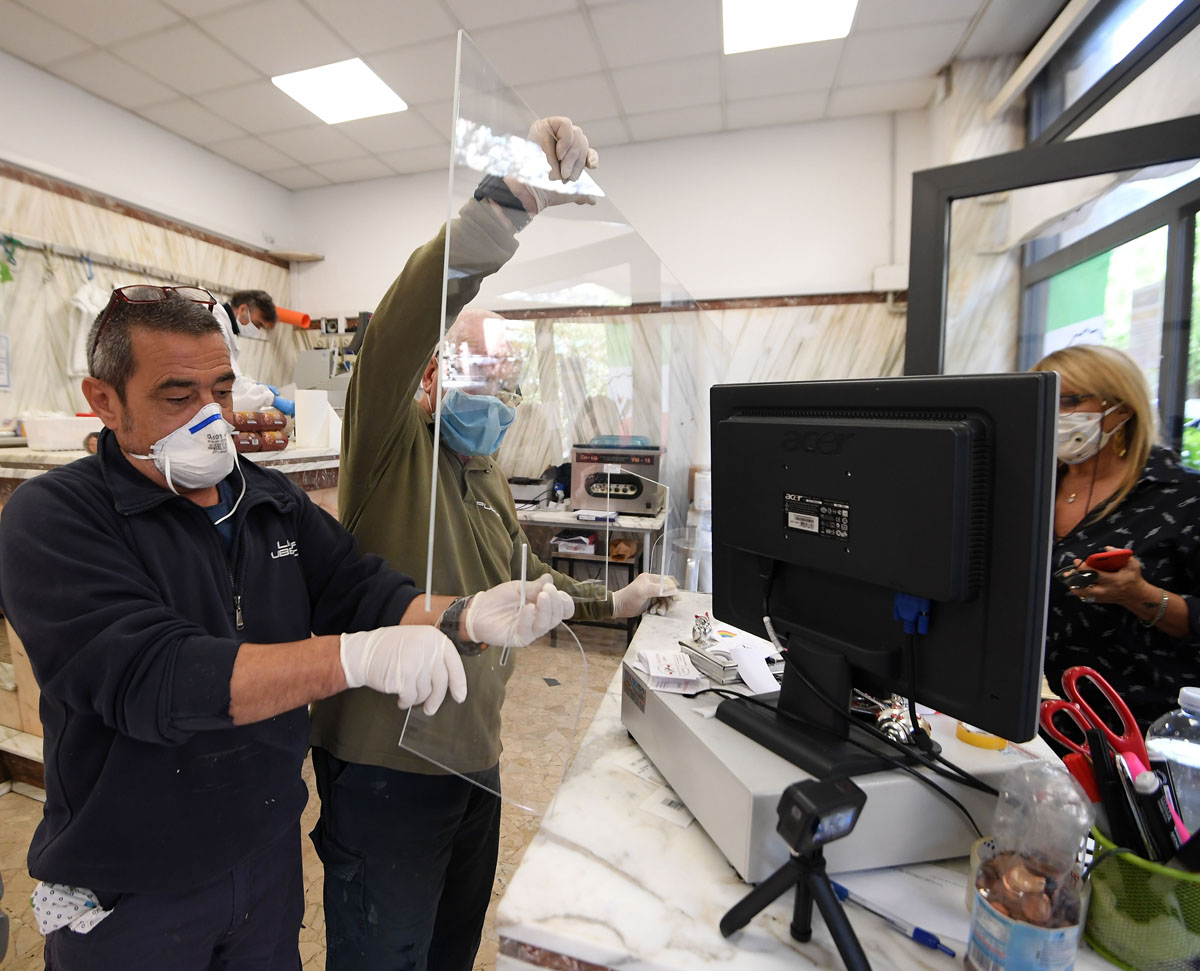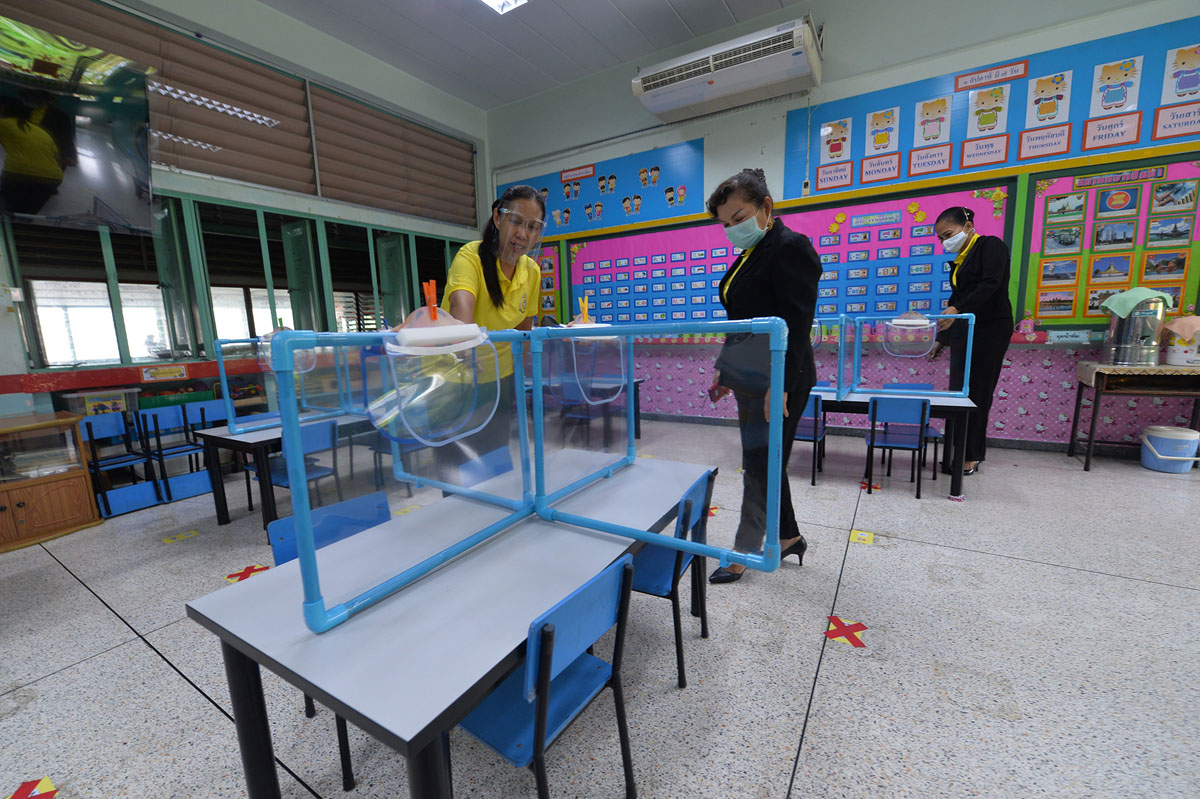
We know that plastic face shields are ineffective at preventing the transmission of the airborne coronavirus. Shields should only be used in conjunction with masks that go over the nose and mouth. What about the plastic barriers that went up last year in grocery stores, gas stations and offices? We’ve been under the impression that those must work somewhat to help keep people safe. The New York Times has a new article about barriers, citing multiple studies and quoting engineers and scientists. Studies show that plastic barriers are only good at blocking large droplets. Unless a room is designed by an airflow specialist, the barriers can work to concentrate aerosols in a smaller area. The Times tells readers to imagine aerosols like cigarette smoke. If you had people smoking (talking) in a room all day, of course giant shields would trap that air somewhat. Here’s some of that article, with more at the source:
Intuition tells us a plastic shield would be protective against germs. But scientists who study aerosols, air flow and ventilation say that much of the time, the barriers don’t help and probably give people a false sense of security. And sometimes the barriers can make things worse.
Research suggests that in some instances, a barrier protecting a clerk behind a checkout counter may redirect the germs to another worker or customer. Rows of clear plastic shields, like those you might find in a nail salon or classroom, can also impede normal air flow and ventilation.
Under normal conditions in stores, classrooms and offices, exhaled breath particles disperse, carried by air currents and, depending on the ventilation system, are replaced by fresh air roughly every 15 to 30 minutes. But erecting plastic barriers can change air flow in a room, disrupt normal ventilation and create “dead zones,” where viral aerosol particles can build up and become highly concentrated…
While further research is needed to determine the effect of adding transparent shields around school or office desks, all the aerosol experts interviewed agreed that desk shields were unlikely to help and were likely to interfere with the normal ventilation of the room. Depending on the conditions, the plastic shields could cause viral particles to accumulate in the room.
Aerosol scientists say schools and workplaces should focus on encouraging workers and eligible students to be vaccinated, improving ventilation, adding HEPA air filtering machines when needed and imposing mask requirements — all of which are proven ways to reduce virus transmission.
Early this year, well before vaccines were available, I went to pay taxes at my local county office. None of the staff inside had masks on and instead used plastic barriers with giant openings at the bottom separating them from the public. The county office one town over had an outbreak two weeks prior to that. I was mortified to see that but I felt somewhat safe because I was double masked. I kept my mouth shut because those people can make my life miserable. Plus I figured that they would learn the hard way soon enough.
The only thing surprising about these findings is that fact that it took so long for this to become public. Engineers have known this and some of these studies were conducted years ago using other airborne diseases. I guess we’ve been so busy fighting multiple battles that the plastic shield issue seemed like a minor one. I’m tired but the only thing I can do is continue to wear a mask, socially distance and get the booster shot when it’s available.
Maybe shields that allow for air flow are OK though, like this one which just separates staff and customers:
photos credit: Avalon.red and via Instagram












I honestly don’t know if I can ever enjoy buffet dining again. Or salad bars in general.
I found salad bars gross before covid.
I have seen too many coughs/drops/licks/touchings in the cafeteria to trust any food freely available to customers.
Yeah, I found salad bars and buffets questionable even in the ‘beforetimes’. I can’t remember the last time I ate at a buffet restaurant, to be honest.
@ merricat: I stopped eating at buffets years ago after witnessing typical obnoxious human behavior at them way too often.
Yes to all this. I do miss the Mother’s Day Brunch, though.
I miss salad bars so much. My place of employment got rid of them, understandably so, and replaced them with prepared salads and it’s just not the same.
I worked in an office for students where “management” decided to put up a plastic barrier at one part of the front counter. This thing didn’t even span the entire length of the counter. The funny thing is because they thought they knew best, didn’t even ask stff where would be the best place to put it (i.e. where students normally stand when talking to us). They just put it at Point A…and every single person (from students to delivery personnel to other staff) just moved over and talked to us at Point B, where there was no barrier!! Completely useless.
It’s like that at most places I’ve been to. People just move around the plastic barrier. It’s all completely useless.
The picture of that crowded restaurant— if you take the analogy of the cigarette smoke, I would prefer there be some kind of barrier to keep smoke in the vicinity of the patrons who are smoking, instead of having it spread throughout the room. I know the analogy doesn’t quite work for covid, but I think there may be value to them in certain environments.
Or just have vaccinated and non-vaccinated sections in a restaurant (and airports, and trains, and other public spaces) like the designated smoking areas we have now.
My mother works at the post office where they each have a designated station and plastic barriers. I think it could work in that scenario also— she takes care of her station religiously disinfecting things at regular intervals and it helps HER feel safer from and reduces exposure to customers who are unmasked and want to get in her face. But in situations where the person at the register, etc, is different each time, I can see it doing more harm than good.
Like everything, I think proper design and use is key.
I guess that NFL QB who said he’d rather sit in a plexiglass box on the sidelines than get vaccinated is going to have to go back to the drawing board…
LOL.
I’ve known in my heart that those things were useless since they first started to put them up.
My husband and I were running errands this week and thought we could grab a quick lunch (our first eating out at a place, too!) at an empty-ish looking place. It stayed empty-ish except for a mom and a bunch of kids who plunked down in the booth right behind us. There were those plastic sheets on the top of the booth for like three feet or something, but no other distancing. Just a total waste of time. I kept thinking to myself, this is so dumb, we’re taking such a chance just for these mediocre sandwiches!
Something I have learned about covid is that the ‘viral load’ matters. Any study if the plastic barriers, when installed correctly, might at least help lessen potential viral load?
The number of infectious particles always matter. For sars-cov-2, even for Delta, one still need to absorb quite a big number of particles to develop covid (vs measles where 1 particle can get an unvaccinated person sick).
When dealing with an airborn pathogen, plexiglass will let accumulate particles in the air over time. They’d normally be dissipating in the air as people move, doors open, etc., but plexi would actually prevent their dispersion making it more likely that a significant amount of infectious particles remain in a specific area
I work with the public and the incidence of angry MAGA types spitting on you has gone way up. It’s so bad that well after the face shields were declared useless, my employer ordered anyone confronting an angry customer to wear one. The barriers between tables may be useless, but the barriers between the public and cashiers and clerks have been a godsend.
This was my thought – that the barriers between cashiers and the public may not be great in some ways, but they provide another benefit for the cashier, even if its just insuring that the customer cant reach across the counter or get too close to the cashier etc.
well that’s just horrible
Ugh,I had a feeling these weren’t doing much. Now I’ve been reading stories about how ineffective masks are unless they have filters or are actual N95s. So many of us are probably wearing the wrong materials or fittings and aren’t effective as they should be. God this is stressful and feels never ending.
I think that goes back to the regular masks are more to keep your germs in, rather than protect you from incoming germs. That’s why when everyone wears a mask, they’re more effective, which we saw in countries where mask wearing is commonplace.
Yeah I’ve been wearing either N95 or a mask with a filter the whole time because I just didn’t feel comfortable with a cotton only mask. They definitely make your voice muffled but it’s worth it.
The place I worked at was obsessed with these plastic things. I always found it funny because it’s just plastic and only covers a certain area how can that protect anyone fully? I feel bad for mother Earth all that plastic will become waste.
Looks like plexiglass is recyclable, at least. I have a feeling a lot of cashiers and people will be happy to leave them, it’s a bit of security, plus you don’t have people as in your face as usual. Most places I’ve seen have just done that, a small barrier at the cashier, nothing that’s going to drastically impact air flow.
Maybe they help to keep attacking customers away….there are some angry people I’ve seen out there on video.
In my workplace (public library in suburban Chicagoland), I’m in favor of keeping the plastic barriers. Even pre-Covid we had instances of patrons sneezing and coughing on us-very little respect for appropriate personal space.
Sad to say the barriers also help me feel safer from physical violence in my workplace. We’ve had numerous incidents with patrons yelling, cursing, threatening harm, bringing in guns. At least with the physical barrier, they’re further away from me if/when their behavior crosses the line.
In the absence of effective solutions people will latch on to ineffective solutions because feeling powerless is worse.
I barely have a part time job as the kids needs are erratic- bud one day, or the next, quarantine this or that…so I work w the public and every day is an horror show.
Always write the company or call to speak w an owner. Poor sots like us aren’t paid enough to hear coviComplainers.
I barely have a part time job as the kids needs are erratic- bud one day, or the next, quarantine this or that…so I work w the public and every day is an horror show.
Always write the company or call to speak w an owner. Poor sots like us aren’t paid enough to hear coviComplainers.
Even if not totally effective, it’s nice for staff tbey aren’t directly coughed/sneezed on, and grubs aren’t able to invade personal space. How many times have I seen customers leaning right in while the checkout person was trying to work. Ew.